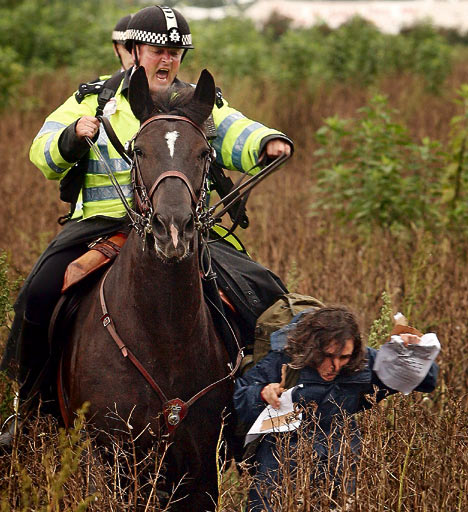 Dick's Driveway
Hundreds topple Cheney effigy outside Wyoming home
Dick's Driveway
Hundreds topple Cheney effigy outside Wyoming home
August 14th, 2007 1:38 pm
War Protesters March on Cheney's Home in Wyoming
Hundreds Cheer 'Toppling of Vice President's Statue'
By Gil Brady / New West Politics
WILSON, Wyo. ?- Demonstrators gathered Saturday afternoon at the rustic crossroads of U.S. Highway 22 and the Village Road to protest the war in Iraq and local resident Vice President Dick Cheney.
Following anti-war speeches and folksy, 60s-style sing-a-longs, the crowd of about 250?-ranging in age from toddlers in strollers to a 92-year-old woman?-marched peacefully along the mile-plus county bike path before assembling outside the gates of the tony Teton Pines Country Club where the vice president owns a home.
Cheney, who earlier in the day attended the dedication of Grand Teton Park's new visitor center, honoring the late Senator Craig Thomas of Wyoming, did not appear at the rally or the protest outside his residence.
Military veterans, friends, families, at least one politician and unaffiliated individuals carrying anti-war signs and other messages - some demanding the vice president's impeachment and accusing the White House of lying about why America invaded Iraq ?- attended the event.
"No more blood of children. Not theirs, not ours," read one cardboard and black marker sign hanging around the neck of a young boy standing near a makeshift stage.
During the pre-march rally, a towering effigy of the vice president, carrying a fishing pole and squirting oil derrick, and smaller bust of President Bush, with red devil's horns, was unveiled to hoots, hollers and other expressions of approval prior to performances by musicians and speakers.
Nick Rowley, a veteran of the war in Bosina who said he served in the military for six years and left just before 9/11, spoke at length about what he thought supporting the troops in Iraq meant.
"What you all are doing here is you're here supporting the troops," Rowley told the crowd. "We need more of that
As soldiers we make a promise to fight for freedom and we expect to be sent into harm's way only when necessary and for the right reason."
About the official rationale for going to war, Rowley added, "It's all based on a lie. The morale (among the troops) is not good. It's only getting worse and no one is doing anything about it."
Outstretching his arms while rubbing his thumbs along his fingertips, Rowley continued, "We're there for money, for oil, for Halliburton. We're not there for freedom or any American reason."
The vice president's former employer, oil service giant Halliburton, was as much a subject of criticism and ridicule at Saturday's event as Cheney himself.
Other guest speakers and artists attending the anti-war rally included state Rep. Pete Jorgensen, (D-Jackson), writer Alexandra Fuller, Jackson lawyer Kent Spence and musician Peter Chandler.
"You don't know me, but Cheney I know you," a musician, strumming a guitar, sang. "Operation Iraqi Liberation spells..."
"O-I-L," the crowd loudly rejoined before Fuller, a South African native who now lives in Wyoming, took the stage.
"We need to find creative ways to make peace," Fuller said. "Our leaders have let us down. I genuinely think that they think they could go over (to Iraq) and scribble (out) anyone who didn't look like us. That's middle-school thinking. I don't want to live in a middle-school world."
Jorgensen encouraged those dissatisfied with the status quo to let their congressional delegation not in attendance?-Republicans Barbara Cubin, Sen. John Barrasso and Sen. Mike Enzi?-know how they felt. He also warned the crowd composed of many baby-boomers and seniors that politicians want to "put Social Security in the stock market."
"Who's bailing us out? Europe and China," the state lawmaker cautioned before telling those present to "pick a candidate, I don't care who, that generally agrees with you then vote next November."
Event spokesman Jim Stanford, a former Jackson Hole News & Guide reporter and campaign aide to Wyoming Gov. Dave Freudenthal (who did not attend), said the peace rally was organized about a month earlier with the help of Jackson resident Karen Hogan.
On Thursday nights on the Jackson Town Square, Hogan and others have assembled to protest the war.
In recent days an unnamed group had taken out full-page advertisements in the local press announcing the march. The ads also blamed the vice president for the deaths of American soldiers and Iraqis and for taking his August vacation in Jackson Hole and going fishing, a favorite Cheney past time, "while Iraq burns."
Since his arrival here earlier this week, Cheney has come under fire from locals complaining about black helicopters, presumably part of the vice president's security detail, flying overhead and disturbing their peace. During his four-decade Washington career, Cheney's frequent August vacations in Jackson had never been met with such bold and outspoken public dissent before today's rally.
According to the News & Guide, the vice president's office declined to comment on the event. But Joe Schloss, chairman of the Teton County Republican Party, dismissed the notion that any one administration official could be responsible for the deaths of troops during wartime. Schloss also told the paper that protesters were looking for a scapegoat in the vice president.
Asked about Democrats in Washington recently voting with Republicans to extend the White House's controversial rewrite of the Foreign Intelligence Surveillance Act, allowing the government to intercept and eavesdrop on the communications of Americans without warrants, Jorgensen said, "I didn't understand how that happened at all. It looks to me like the Democrats rolled over and there's no excuse for that."
Regarding accusations by some rally-goers that Cheney and Bush lied before sending troops to invade Iraq, Jorgensen added, "From my point of view...I think (Bush and Cheney) misrepresented the reasons for why they went to war and the intelligence for WMD. I don't think they've been honest about anything."
The Senate Select Committee on Intelligence revealed last September that U.S. analysts were strongly disputing the alleged links between Saddam Hussein and al-Qaeda while senior Bush administration officials were publicly asserting those links to justify invading Iraq. However, the committee, run by chairman Sen. John D. Rockefeller IV, (D-W.Va.), has not issued its phase two report on whether the White House deliberately manipulated available intelligence before going to war.
Comparing the current administration to age-old tyrants, Spence encouraged the crowd to remember that America was founded by those who he agreed rightly resisted the unjust rule of a British king.
"We are there (in Iraq ) based on a fraud by Cheney and Bush," Spence said during a speech that also criticized Halliburton's questionable war contracts and profits.
"Blood money!" a man shouted as Spence spoke.
Spence's law firm, founded by his famous father Gerry Spence, is currently suing Halliburton and others on behalf of the family of a mineral field worker who died in Wyoming several years ago.
Decked in a cap, shades and green army jacket with his last name over the breast pocket, Stanford told rally-goers readying to march, "Today we have struck a blow against apathy..., which is how we got into this mess. We have struck a blow against fear and tyranny!"
Stanford also spoke of the rights and duties of citizens to promote robust dialogue through peaceful assembly and civil dissent.
Responding to a question about what the "W" to his "Worst Ever" sticker on his black briefcase meant, local resident Capt. Bob Morris, who served during Vietnam, said "W stands for W, President Bush."
Gazing from under his floppy straw hat, Morris continued: "The invasion of Iraq is greater than all previous blunders put together." Compared to the Vietnam War, Morris clarified, "That was worse than all previous blunders before this."
Before bicycling off after the half-mile queue of marchers headed for Cheney's home, Morris handed this reporter his handwritten speech, which he did not deliver at the rally. It is reprinted here in its entirety.
"Our occupation of Iraq is a recruiting and training bonanza for al Qaeda," Morris wrote. "One of their spokesmen has said they hope that we'll stay. When finally we leave, there'll be chaos and probably regional war. But the longer we stay, the worse it'll be. On the other hand, let's celebrate our 1991 liberation of Kuwait?-brilliantly done by Defense Secretary Cheney. Let's be grateful to him for that. If only he had rested on his laurels."
Upon rolling the wobbly, 11-foot tall effigy over a mile to the front gate of Cheney's residence, shouting protesters waved anti-war signs at passing and honking motorists, as U.S. Secret Service officers sitting in a black truck and sheriff's deputies looked on, while Stanford hung a lasso around the effigy's neck.
To the chants of "No more war," Stanford, Spence and others toppled the Cheney effigy a second time, knocking the head off as it smashed into the pavement. The delighted crowd applauded and hollered in mock victory as a man draped in a white beach towel, waving an American flag, kicked the effigy's head toward the busy street.
During the early days of the Iraq war, American soldiers and Iraqis memorably toppled a statue of Saddam Hussein that had stood in Baghdad.
No arrests were reported during the rally and march. And by 3 p.m. most of the protesters had disbanded, returning up the bike path to their cars and the bus stop at the Stilson Ranch subdivision.
http://www.michaelmoore.com/words/latestnews/index.php?id=10123
**************************************************
[IMG]http://[/IMG]










